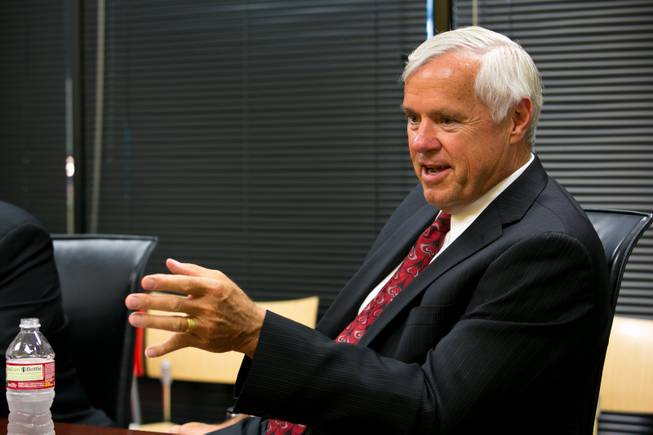
NSHE Chancellor Dan Klaich speaks with the Sun Editorial Board, Tuesday Aug. 20, 2013.
Wednesday, Jan. 22, 2014 | 4:09 p.m.
Nevada’s higher education leaders are expected to appoint an acting UNLV president on Friday.
This month, UNLV President Neal Smatresk submitted his resignation letter, effective Feb. 2. The following day, Smatresk will take the helm of the University of North Texas, near Dallas.
With Smatresk’s pending resignation, higher education leaders have been meeting with campus and community leaders to seek public input on the presidential search. Questions abound:
Should there be a national search for the next UNLV president?
What kind of qualities should the next president have?
If there is a national search, who should lead the university in the interim? Should the regents choose an acting president (who will serve between six months and a year and doesn’t apply to become a permanent president) or an interim president (who serves between one and three years with the goal of eventually becoming the permanent president)?
After three days of community meetings, Nevada System of Higher Education Chancellor Dan Klaich will submit a summary report and make a recommendation on the acting president. Regents are expected to vote on the recommendation during a special meeting Friday.
A simple majority (seven votes) is necessary to confirm Klaich’s recommended appointment. If regents don’t agree with his pick, they could vote on another candidate for acting president, or move to appoint an interim president, which requires a supermajority (nine votes).
Three names have surfaced on a short list of candidates for the acting presidency, according to Board of Regents Chairman Kevin Page. They are:
• Carol Harter, a former longtime UNLV president who was asked to resign in 2006 by former Chancellor Jim Rogers. Harter is the executive director of the Black Mountain Institute, a literary center for creative writers and international scholars. Harter is interested in the acting presidency, but not the permanent job, Page said.
• Don Snyder, a former UNLV Hotel College dean who stepped down last year to lead the university’s efforts to build an on-campus football stadium. Snyder, a former casino and banking executive, is chairman of the UNLV Campus Improvement Authority Board, which is tasked with recommending a stadium proposal to the Nevada Legislature by September. He also is interested in the acting presidency, but not the permanent job, Page said.
• John Valery White, a former UNLV Law School dean who now serves as the Executive Vice President and Provost of the university. White, who has a law degree from Yale, is not interested in the acting presidency since he hopes to apply for the permanent job, Page said.
Today, Klaich and Page held their final public input meeting, which was attended by nearly 100 people — mostly faculty, staff and alumni. The vast majority favored a national presidential search, but some questioned the timetable. Page hopes to have the next permanent UNLV president in office by Sept. 1.
“I’m hopeful for Sept. 1, but it’s not a drop-dead date,” Page said. “However long it takes, we’re going to get the right person.”
Attendees voiced mixed opinions about the most desirable qualities for the next UNLV president.
The majority wanted the next president to carry on Smatresk’s legacy initiatives: to create an allopathic medical school in Southern Nevada, build an on-campus football stadium to boost campus life and increase UNLV’s prestige and research status toward a Tier-1 research institution.
Most of all, attendees said they hope to attract someone who will stay in Nevada for a long time.
However, while some wanted to nab a sitting president or provost from a top-tier research university, others hoped regents would look beyond academics for the job: business leaders and former political leaders.
“A business leader would be well-positioned to understand the role of the university within the ecosystem of the state and what the state needs in terms of workforce development and skills,” said Ken Peffers, a Lee Business School professor. “The next UNLV president needs to understand our economy.”
“Business leaders don’t necessarily translate to exceptional university leaders,” replied Andy Fry, a retired UNLV history professor. “University cultures are different. We don’t exist to turn a profit. We need a competent fiscal manager, but someone who is able to further what universities are about: teaching and research.”
If regents decide to conduct a national presidential search, the next step will be to convene a presidential search committee, a group of six regents who will recommend a name for the permanent president to the larger 13-member Board of Regents.
To cast a wide net for diverse and qualified candidates, regents will likely hire an executive search firm, Page said.
Klaich, Nevada’s higher education chancellor, said the state’s transparency laws may inhibit the presidential search. That’s because sitting presidents and provosts are less likely to apply for the UNLV presidency given that the search process must be public, per the state’s open meeting laws.
“We have a bright sunshine law and we will obey the law to the letter,” Klaich said. “But we need to understand there will be candidates we will not be able to attract. We can actively recruit and try to shelter folks as long as possible, but there will come a point in time when their names will be named public. This is the state we live in.”

Join the Discussion:
Check this out for a full explanation of our conversion to the LiveFyre commenting system and instructions on how to sign up for an account.
Full comments policy